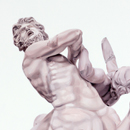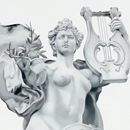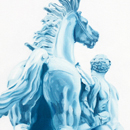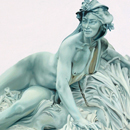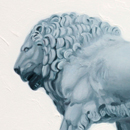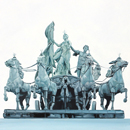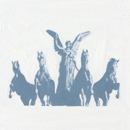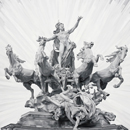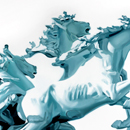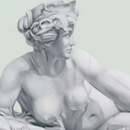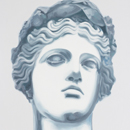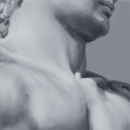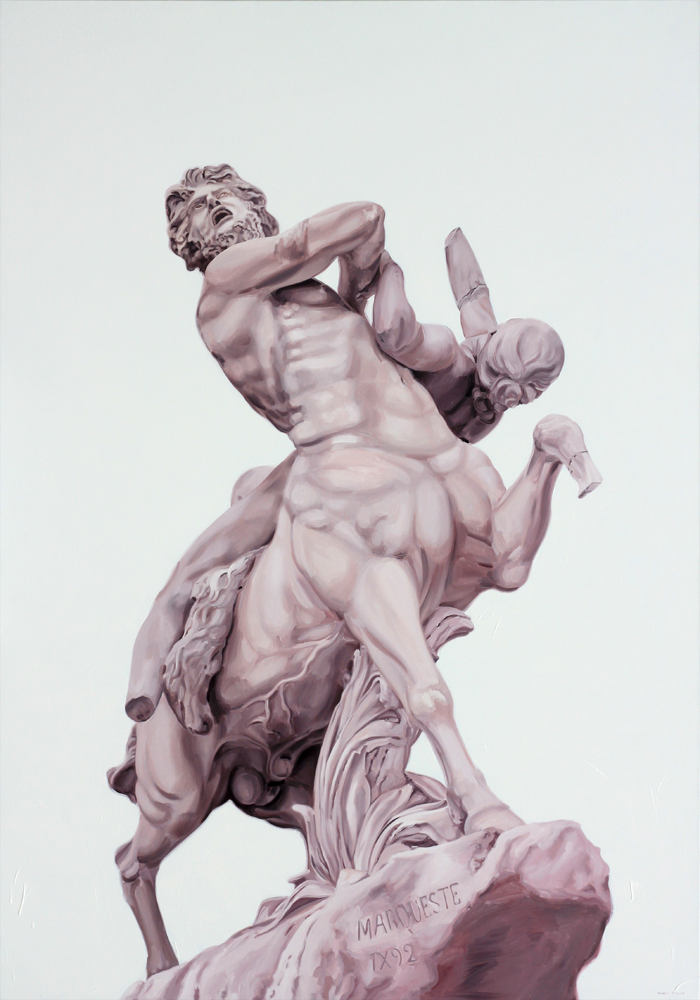
The centaur Nessus carrying off Dejanire (After Laurent-Honoré Marqueste (1892), Jardin des Tuileries, Paris), oil on canvas, 200x140cm, 2012 n
PL/EN/DE/FR MONUMENTS PL Poprzez serie Monuments, Roszczak odwołuje się do momentu w pełni nasyconego uświadomienia, momentu oczywistego i doskonałego, euforycznego stanu świadomości oraz wspomnień, będących przypominaniem sobie tegoż doskonałego stanu. - Zwykle bywając w różnych miejscach, oswajam się z zastaną rzeczywistością nie tylko poprzez wzrok, ważna jest dla mnie także, percepcja innymi zmysłami np. poprzez: dotyk, powonienie i słuch... Miałbym spore wątpliwości czy rzeczywiście doświadczyłem obecność np. Wieży Eiffla, bez możliwości jej dotknięcia? Nie wystarczyło by mi tylko samo wizualne postrzeganie obiektu lub miejsca - równie dobrze mógłbym popatrzeć na zdjęcie, wydruk lub film dotyczący Wieży Eiffla. Przekonanie o realności dopełnia się, także poprzez możliwość dotyku - co dla mnie bywa maniakalną koniecznością. […] zdarza mi się często, że odwiedzając jakieś miasto, muskam palcami fasady budynków, lub stojące przed kawiarniami oparcia krzeseł, po to aby jeszcze bardziej upewnić się o obecności w jakimś miejscu. […] często z zaciekawieniem obserwuję turystów fotografujących „typowe plenery i obiekty”. Interesuje mnie proces oraz przyczyna takiego działania? Zastanawia mnie co dalej z tymi wszystkimi zdjęciami? Przecież, w dobie Internetu nie trudno o znalezienie miejsc w których się było. Czy to obawa przed zwątpieniem w doświadczenia – mechanizm obronny podświadomości? Byłem tam, oto mam fotograficzny dowód.. jak bardzo realne wydają się być własne wspomnienia? Patrząc na fotografie z dzieciństwa, nie tylko nie potrafimy się utożsamić ze sobą w wersji młodszej ale i otaczająca „realność” wydaje się być nieprawdziwa, pomimo fotograficznego dowodu – iluzoryczna, zdematerializowana w naszej pamięci… Skąd ta potrzeba i ciągłe potwierdzanie w zaznaczaniu swojej obecności? Jakie są tego przyczyny? Kompensacja wspomnień - próba odzyskania czegoś co zostało utracone. Seria Monuments powstała jako pretekst do nawiązania dialogu z tym co, było i minęło... także postawienie sobie pytania; na ile realne są wspomnienia? Uświadomienie sobie płynnych granic doświadczania. Wspomnienia, nostalgia, przemijanie i niepewność – obszarami eksploracji i badań. EN - Usually when I go somewhere, I try to learn about the setting, not through what I see. Other senses are equally important - sense of touch, smell or auditory experience... It would be hard to say that I have experienced the presence of e.g. the Eiffel Tower, if I were not to touch it. Visual perception would not satisfy me. If it would, I might equally well look at a photograph, a print or a clip featuring the tower. A touch supplements the feeling of tangibility - I keep touching things as if I were a lunatic. [...] often when I visit a town, I fondle with my fingers building facades or backrests of cafe chairs to be more positive that they are there. [...] often I would watch tourists walking by and taking snapshots of must see places. Am I interested in the process itself or the cause of such an action? I wonder what eventually happens to all those pics? With internet it is quite easy to find places you've never been to. Is this because we are afraid of that we could doubt the experience - sub-consciousness self-defense mechanism? I've been there, here is the proof, a photo...how real our recollections appear to be? When I look at the pictures taken when I was a child I find it hard to see myself as a younger version of me, on the other hand the surrounding reality seems to be unreal, despite the evidence, photos - it seems illusory, intangible in our memory...Where this need to verify the existence of things come from? A constant need of leaving a footprint? What are the reasons for that? Compensating memories - an attempt at recovering something that was lost. Monuments series is an excuse for attempting to establish a dialogue with things that are gone...How real are our memories? Trying to see blurred borders of our experience. Memories, nostalgia, fading and uncertainty - areas for exploration. DE - Es ist meistens so, dass ich - wenn ich an unterschiedlichen Orten bin - mich an die vorgefundene Wirklichkeit nicht nur durch die Sehkraft gewöhne, wichtig ist für mich auch die Perzeption mit anderen Sinnen, z. B. durchAnfassen, Riechen und Hören…Ich hätte große Zweifel, ob ich die Gegenwart des Eiffelturmes erfahren habe, wenn ich keine Möglichkeit gehabt hätte, ihn anzufassen.Mir hätte selbst die visuelle Wahrnehmung nicht gereicht, genauso gut hätte ich mir ein Bild, einen Folder oder einen Film über den Eiffelturm ansehen können.Die Überzeugung über die Realität erfüllt sich durch die Möglichkeit, etwas anzufassen - was für mich einfach eine manische Notwendigkeit ist. […] es kommt häufig vor, dass ich - wenn ich eine Stadt besuche - die Gebäudefassaden oder die Lehnen der vor den Cafés stehenden Stühle mit meinen Fingern leicht streife, um sich noch stärker von meiner Anwesenheit an einem Ort zu überzeugen.[…] ich beobachte häufig mit Interesse Touristen, die „typische Orte und Objekte” fotografieren.Mich interessiert der Prozess und die Ursache solchen Handelns.Ich überlege mir, was später mit all den Bildern passiert.Zu den Zeiten, wenn Internet allgemein zugänglich ist, ist es nicht schwierig, die Orte zu finden, an denen man war.Ist es die Angst vor dem Zweifeln an Erfahrungen - Abwehrmechanismus des Unterbewusstseins?Ich war dort, ich habe einen Nachweis in Form eines Fotos.Wie weit real scheinen die eigenen Erinnerungen zu sein?Wenn wir uns Bilder aus eigener Kindheit ansehen, vermögen wir es nicht nur, sich mit sich selber in jüngerer Version zu identifizieren. Vielmehr scheint die uns umgebende „Realität” nicht wahr zu sein, trotz des fotografischen Nachweises - sie schein in unserer Erinnerung illusorisch und dematerialisiert zu sein… Wo hat das Bedürfnis, die eigene Anwesenheit ständig zu bestätigen, sein Quelle?Was sind die Gründe dafür? Kompensation von Erinnerungen - ein Versuch, etwas zurück zu bekommen, was verloren wurde.Die Serie Monuments als ein Anlass zur Aufnahme des Dialogs damit, was war und verging… Auch das Stellen der Frage, wie weit die Erinnerungen real sind?Sich die flüssigen Grenzen der Erfahrung bewusst machen.Erinnerungen, Nostalgie, Vergehen und Unsicherheit - die Explorationsgebiete. FR - D’habitude, en étant dans différents endroits je m’habitue à la réalitée qui ne se présente pas seulement par le regard. Ce qui est aussi important pour moi ce sont les autres sens, comme le toucher, le goût... J’aurais vraiment eu des doutes d’avoir senti la présence de la tour Eiffel si je ne pouvais la toucher. La perception visuelle ne me suffirait pas. Je pourrais aussi bien la regarder de loin, sur une photo ou dans un film. La conviction de la réalité des choses se manifeste dans ma vie par la possibilité de toucher les choses, ce qui est devenu pour moi une nécessité maniaque. Il m’arrive d’être dans une ville et toucher sans cesse les murs des bâtiments, les chaises dans des cafés, seulement pour sentir encore plus ma et leur présence dans ce lieu. Je vois souvent les touristes qui prennent en photo des « lieux et objets types ». Je me pose la question concernant le processus et les causes d’un tel comportement. Qu’est ce qui se passera avec toutes ces photos ? A cette époque de l’internet, ce n’est pas difficile de trouver les lieux où on se situe. Est-ce que c’est une sorte de défense ? La peur de douter dans ce qu’on a vécu ? J’y étais, j’ai des photos... Quelle réalité trouve-t-on dans nos propres souvenirs ? En regardant les photos d’enfance, il nous est difficile de nous identifier à notre époque car la « réalité » nous semble fausse, quoique qu’on en ait une preuve palpable, illusoire, dématérialisé dans notre mémoire. D’où vient cette nécessité et la confirmation constante de marquer notre présence ? Quelles en sont les causes ? Une compensation de souvenirs – un essai pour rattraper quelque chose qui a été perdu. La série MONUMENTS comme un prétexte d’un dialogue avec ce qui s’était passé... Mais aussi pour poser des questions sur la réalité des souvenirs. Se rendre compte des frontières floues. Souvenirs, nostalgie, passage, incertitude – les champs d’exploit.
© Roszczak 2012-2024
